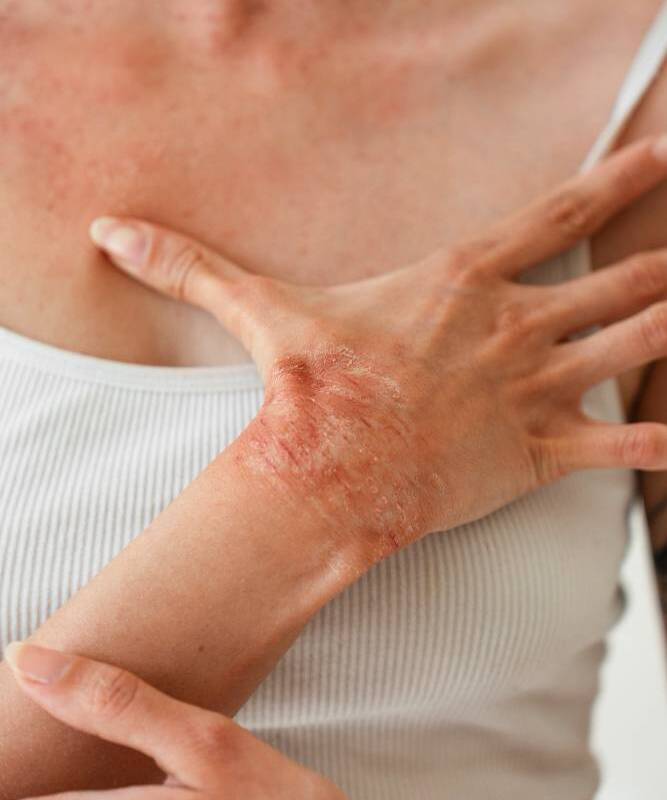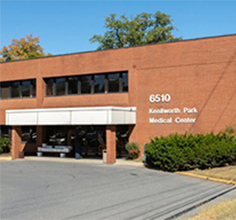
Dermatitis, an often painful skin condition characterized by redness, itching, swelling, or blisters, can be managed and treated effectively through various means with help from medical practitioners. Southern Maryland Medical Group discusses what exactly dermatitis is and what you should expect during an appointment with your primary care physician.
Different types of dermatitis include contact dermatitis, atopic dermatitis (eczema), and seborrheic dermatitis. Each type may have a slightly different cause or trigger, but they all share the same primary symptoms, like red and itchy skin.
Dealing with dermatitis can be frustrating, especially when it keeps returning or doesn’t seem to improve with home remedies.
When you notice dermatitis symptoms, consulting your primary care doctor is often the first step towards treatment. Primary care doctors diagnose and treat various health issues, including skin conditions like dermatitis. When looking to alleviate your symptoms or diagnose what caused them in the first place. They're your go-to professionals when searching for answers about why the skin flared up so severely.
Your doctor will likely ask about your symptoms and medical history during your visit. They may want to know when the problem started, if you've tried any treatments, and whether you have known allergies. This information helps your primary care doctor determine your type of dermatitis and what's triggering it.
A primary care physician can often diagnose dermatitis by looking at your skin and discussing your symptoms. However, if the cause of your dermatitis isn't immediately apparent, they might recommend additional tests. For example, your doctor may suggest a patch test to check if an allergic reaction is causing your symptoms. They might also take a small sample of skin (called a biopsy) to rule out other skin conditions.
Tests like these can help your physician accurately identify which form of dermatitis you have and any contributing factors that worsen it, giving them the knowledge needed to develop a personalized treatment plan tailored specifically to you.
Once your primary care physician has identified your type of dermatitis, they will discuss treatment options with you. Treatment will depend upon the severity and type of dermatitis you're currently dealing with. Here are some common treatments that your doctor might recommend:
Topical treatments are creams, ointments, or lotions applied directly to the skin. They are often the first line of defense in treating dermatitis. Your doctor may suggest corticosteroid creams to relieve inflammation and itching. Over-the-counter moisturizers and creams might be enough in milder cases to soothe the skin and help it heal.
It is essential to follow your primary care doctor's instructions carefully when using topical treatments. Applying the cream as directed can significantly affect how quickly your skin improves.
In some cases, dermatitis may require more than just topical treatments. If your dermatitis is severe or not improving with creams, your primary care physician may prescribe oral medications. These could include antihistamines to reduce itching or corticosteroids in pill form to lower inflammation.
Your primary care doctor will closely monitor your progress while taking any prescribed medication.
One of the best ways to manage dermatitis is to avoid the things that trigger it in the first place. Your primary care doctor can help you figure out what might be causing your dermatitis to flare up. Common triggers include certain fabrics, soaps, cleaning products, or stress. Once you know your triggers, your doctor will advise you on how to avoid them.
In some cases, if your dermatitis is particularly severe or complicated, your primary care physician in Hyattsville might refer you to a dermatologist. Dermatologists are skin specialists who can provide more advanced treatments, like light therapy or more potent medications. However, most people with dermatitis can manage their condition effectively with the help of their primary care doctors.
Dermatitis can be uncomfortable and annoying, but the good news is that there are many ways to treat it. Your primary care physician is well-equipped to help you manage your symptoms and restore your skin to feeling healthy. Whether through topical creams, medications, or avoiding triggers, primary care doctors can guide you toward relief and help you prevent future flare-ups.
Don't hesitate to contact Southern Maryland Medical Group if you're experiencing redness, itching, or other dermatitis symptoms. They have the knowledge and resources to help you get more precise, healthier skin.
Southern Maryland Medical Group has 3 convenient locations to provide professional medical care services in the Southern Maryland area. Call or schedule an appointment with one of our locations to get medical care help.

5801 Allentown Road, Suite 400 Camp Spring, MD 20746
Phone: 301-868- 0150
Billing Inquiries: 301-552-1270
Fax: 301-868-0243

7500 Greenway Center, Dr #1200 Greenbelt, MD 20770
Phone: 301-486-7580
Billing Inquiries: 301-552-1270
Fax: 301-486-7581

6510 Kenilworth Ave, Ste 1400, Riverdale MD 20737
Phone: 301-618-0771
Billing Inquiries: 301-552-1270
Fax: 301-618-0772